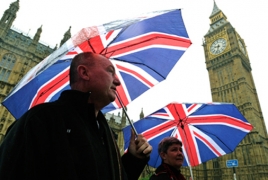
In 2050, London's climate will feel more like Barcelona's, according to a new climate change study, CNN reports.
If this sounds like a pleasant warming -- think again. London could be facing severe drought, as Barcelona did in 2008, when it nearly ran out of drinking water and reservoirs ran close to dry.
Hundreds of other major cities worldwide could be facing droughts, flooding, storms, and other climate catastrophes, said the study, which was conducted by the Crowther Lab at ETH Zurich university.
Some of these climate effects aren't even known or predictable yet -- a fifth of cities, including Kuala Lumpur, Jakarta, and Singapore, are facing conditions so extreme they don't currently exist anywhere in the world, according to the study.
The study predicted the future climate conditions of 520 major cities worldwide, and paired those predictions with the conditions of cities today. By 2050, Madrid will feel more like Marrakesh, Seattle will feel like San Francisco, and New York will feel like Virginia Beach, according to the report.
Drawing these city-to-city comparisons can "help people visualize the impact of climate change in their own city, within their lifetime," said Jean-Francois Bastin, lead author of the study.
An estimated 77% of cities around the world will see their climate conditions drastically change, indicating "the global scale of this climate change threat and associated risks for human health," the study warned.
Regions with northern latitudes, including most of Europe, will face the most dramatic temperature changes -- European cities are expected to become 3.5 degrees Celsius (6.3 Fahrenheit) warmer in the summer and 4.7 degrees Celsius (8.5 Fahrenheit) warmer in the winter, the study said.
In London, for example, the warmest month will rise by 5.9 degrees (10.6 Fahrenheit), leading to a mean annual temperature rise of 2.1 degrees (3.8 Fahrenheit).
These might not sound like significant shifts, but warming temperatures could encourage the spread of infectious disease, endanger food security, and lead to water shortages, said Alex Lo, a senior lecturer in climate change at the Victoria University of Wellington in New Zealand.

